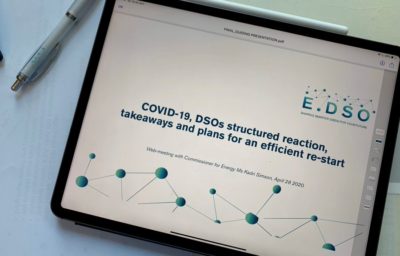COVID-19, DSOs structured reaction, takeaways and plans for an efficient re-start
On Tuesday 28 April 2020, a videoconference was organized between E.DSO Executive Committee Members and the European Commissioner responsible for Energy, Ms. Kadri Simson. The main objectives of the meeting were to assess the measures already taken to reinforce preparedness and ensure power supply to their 350 million connected customers during the COVID-19 outbreak and identify possible contributions of the energy sector to a Green Deal recovery after the pandemic.
In response to the challenges associated with the COVID-19 pandemic and the measures taken to limit its outbreak, E.DSO has created a platform of regular online roundtables among its Board members, with the aim of sharing knowledge and best practices on the continuity of energy operations, whilst protecting the health and safety of staff and customers. E.DSO members acknowledged that the energy sector has been resilient in this difficult time and that, currently, there is no risk of disruption in energy distribution systems.
“Resilience is the outcome of a strong cooperation between all DSOs which remain strongly committed to participate in the Green Deal recovery through their efforts and knowledge.”
Christian Buchel, Chairman of E.DSO and director for Territories, Customers and Europe of the French DSO Enedis.
“I am impressed about the reaction of the energy sector to the COVID-19 crisis. DSOs are the ‘last mile’ which bring electricity to the final customer and they can play an important role in bringing sustainable recovery to Europe’s economy, in alignment with the EU Green Deal objectives.”
Kadri Simson, Commissioner for Energy
E.DSO chairmanship also reflected on the innovative tools/instruments and digitalization initiatives as approaches contributing to a fast and efficient recovery, as well as activities or measures that could be rapidly implemented.
The Commissioner also expressed concerns on the EU being currently too dependent on specific supply chains, resulting in an absence of diversification. E.DSO members recognized this concern and emphasized that the recovery plan should focus on deepening the independence of the existing supply chains by locating strategic parts of the value chain in the EU. This also includes the change of the pace and volume of e-mobility and storage uptake that could be fostered by DSOs. They further drew the Commissioner’s attention towards the need for more and smarter investments in the EU, contributing to flexibility and higher efficiency of the energy sector. DSOs are by nature rooted in European regions and local communities. The impact of their work and investments will be felt in many areas. Being very local and spread across the municipalities of all countries, and not just concentrated in one area, they create local jobs and therefore contribute to a just and wide-spread recovery. E.DSO assured investments will not diminish.
Commissioner Simson emphasized that e-mobility is a very important topic of the Green Deal cluster. She further highlighted the importance of accomplishing the energy systems integration strategy as well as promoting big infrastructure projects that will provide incentive for the economy, whilst making the energy system greener.
The Commissioner considered that the ongoing work for the revision of the TEN-E regulation will certainly support project promoters to develop the infrastructure of the future. More electricity projects should be included under the Connecting Europe Facility. The Commissioner also urged that an ambitious MFF was needed to this end.
Finally, Commissioner Simson thanked the Executive Committee team of E.DSO for the fruitful exchange of views and encouraged E.DSO to remain in close contact with her cabinet members.
Christian Buchel and E.DSO Secretary General, Roberto Zangrandi, expressed their gratitude to Commissioner Simson and promised to deliver on the green recovery plans, also by sharing further recommendations with the Commissioner cabinet.
COVID-19, DSOs structured reaction, takeaways and plans for an efficient re-start
On Tuesday 28 April 2020, a videoconference was organized between E.DSO Executive Committee Members and the European Commissioner responsible for Energy, Ms. Kadri Simson. The main objectives of the meeting were to assess the measures already taken to reinforce preparedness and ensure power supply to their 350 million connected customers during the COVID-19 outbreak and identify possible contributions of the energy sector to a Green Deal recovery after the pandemic.
In response to the challenges associated with the COVID-19 pandemic and the measures taken to limit its outbreak, E.DSO has created a platform of regular online roundtables among its Board members, with the aim of sharing knowledge and best practices on the continuity of energy operations, whilst protecting the health and safety of staff and customers. E.DSO members acknowledged that the energy sector has been resilient in this difficult time and that, currently, there is no risk of disruption in energy distribution systems.
“Resilience is the outcome of a strong cooperation between all DSOs which remain strongly committed to participate in the Green Deal recovery through their efforts and knowledge.”
Christian Buchel, Chairman of E.DSO and director for Territories, Customers and Europe of the French DSO Enedis.
“I am impressed about the reaction of the energy sector to the COVID-19 crisis. DSOs are the ‘last mile’ which bring electricity to the final customer and they can play an important role in bringing sustainable recovery to Europe’s economy, in alignment with the EU Green Deal objectives.”
Kadri Simson, Commissioner for Energy
E.DSO chairmanship also reflected on the innovative tools/instruments and digitalization initiatives as approaches contributing to a fast and efficient recovery, as well as activities or measures that could be rapidly implemented.
The Commissioner also expressed concerns on the EU being currently too dependent on specific supply chains, resulting in an absence of diversification. E.DSO members recognized this concern and emphasized that the recovery plan should focus on deepening the independence of the existing supply chains by locating strategic parts of the value chain in the EU. This also includes the change of the pace and volume of e-mobility and storage uptake that could be fostered by DSOs. They further drew the Commissioner’s attention towards the need for more and smarter investments in the EU, contributing to flexibility and higher efficiency of the energy sector. DSOs are by nature rooted in European regions and local communities. The impact of their work and investments will be felt in many areas. Being very local and spread across the municipalities of all countries, and not just concentrated in one area, they create local jobs and therefore contribute to a just and wide-spread recovery. E.DSO assured investments will not diminish.
Commissioner Simson emphasized that e-mobility is a very important topic of the Green Deal cluster. She further highlighted the importance of accomplishing the energy systems integration strategy as well as promoting big infrastructure projects that will provide incentive for the economy, whilst making the energy system greener.
The Commissioner considered that the ongoing work for the revision of the TEN-E regulation will certainly support project promoters to develop the infrastructure of the future. More electricity projects should be included under the Connecting Europe Facility. The Commissioner also urged that an ambitious MFF was needed to this end.
Finally, Commissioner Simson thanked the Executive Committee team of E.DSO for the fruitful exchange of views and encouraged E.DSO to remain in close contact with her cabinet members.
Christian Buchel and E.DSO Secretary General, Roberto Zangrandi, expressed their gratitude to Commissioner Simson and promised to deliver on the green recovery plans, also by sharing further recommendations with the Commissioner cabinet.







